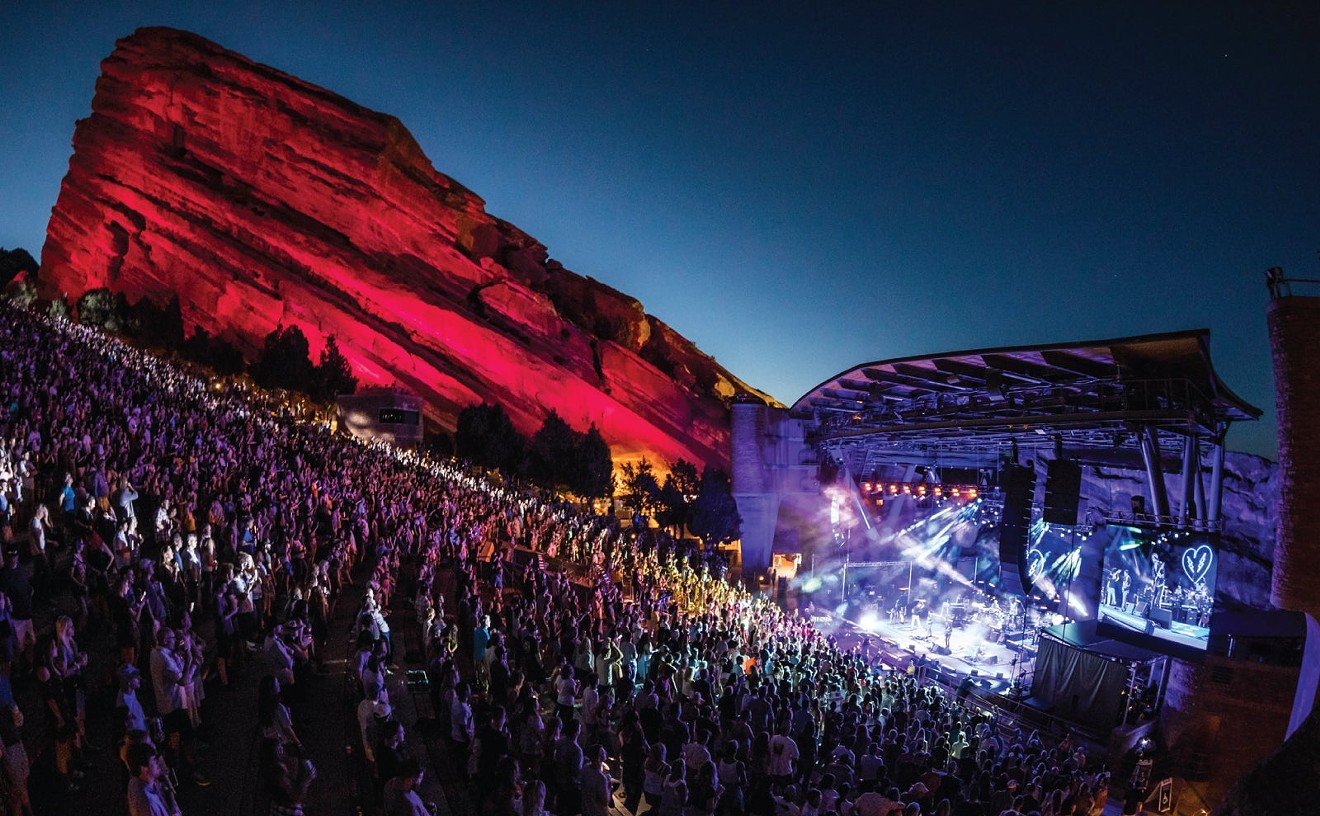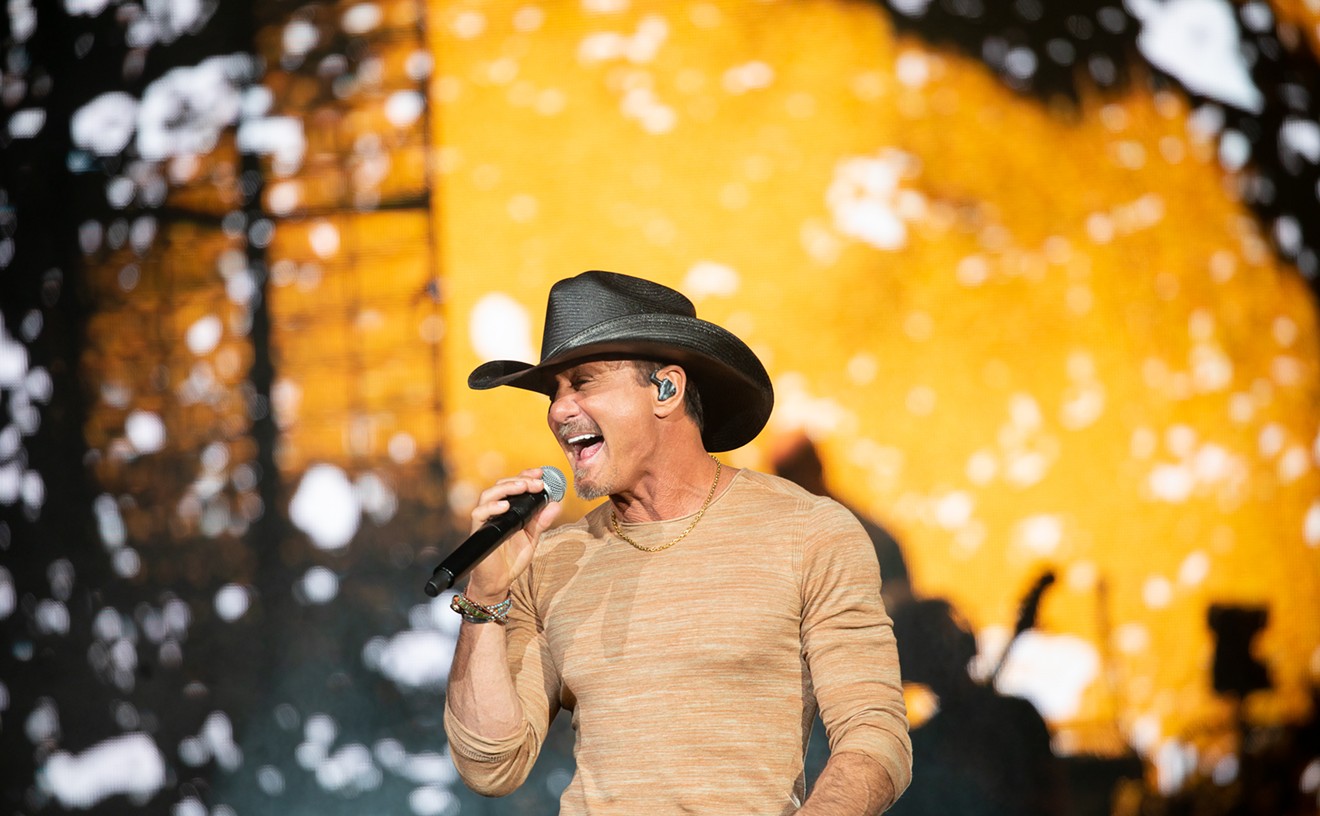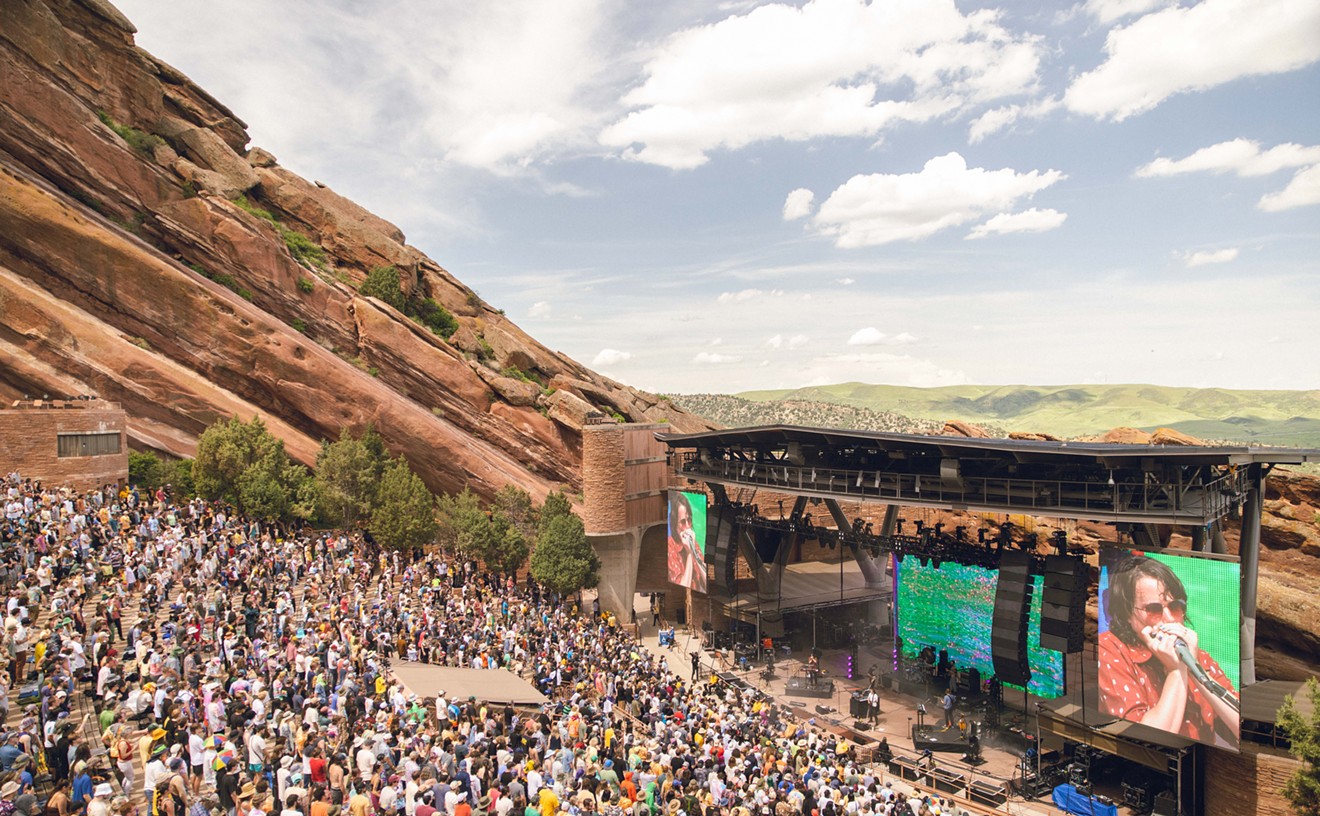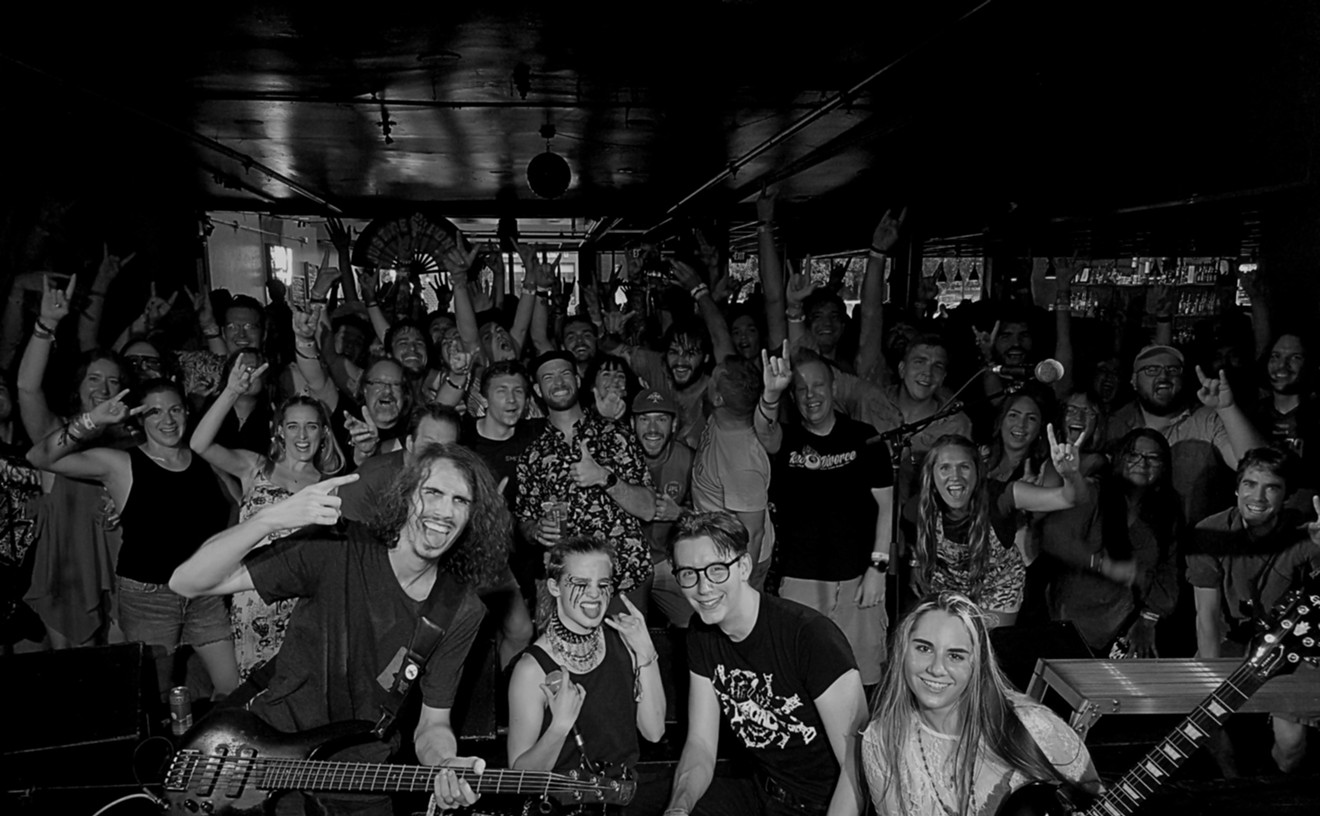Bad Weather California has reached its natural conclusion. Although the outfit still has a string of dates left to play, including a tour kickoff show is this Thursday, August 15, at the hi-dive, celebrating its brand new EP, Back Seats -- due out this week on Fire Talk -- Chris Adolf confirms that this is the end of BWC as we know it.
Bad Weather California was formed from the Love Letter Band. The early Bad Weather shows featured Adolf and a kind of beat-up acoustic guitar delivering an emotionally raw and moving performance that had all the power any rock band could command. A year or two later, Adolf started playing with friends in more of a rock-band format. Those friends included Joe Sampson, Roger Green, Xandy Whitesel, Nathaniel Rateliff and Adam Baumeister.
See also: The members of Bad Weather California are just young punks at heart
The rock eventually evolved into a more funk, even reggae, direction, with the later lineup of Sampson, Baumeister and Logan Corcoran on drums. It was that group that recorded the full-length album Sunkissed, which was released by Family Tree Records, the imprint run by Akron/Family.
Bad Weather, more than many bands, tried different sounds, aesthetics and methods of releasing its music over the course of its nearly decade-long existence. With the band's latest lineup -- Adolf, Corcoran, Tyler Ludwick and Lucas Johannes -- Adolf seems to have written some of the kind of music he's been itching to craft for the past few years.
The songs seem to have been inspired by growing up in the '80s and '90s in places no one brags about, reflecting a time when your sensibilities were shaped by whatever music you could find through friends, on the radio, on TV, or in magazines and so forth, pre-Internet. That sense of innocence and artlessness inspires you to create music simply because it gives you a sense of wonder and joy of discovery. A bit of that can be heard on the band's new and likely final EP, Back Seats.
In advance of Thursday's show at the hi-dive, we spoke with Adolf about the new EP and the breakup of Bad Weather California, and he also talked about underground culture in the time before the Internet, where it is now, and where it might be going.
Westword: Your new Back Seats EP has a completely different sound from your previous releases. It's more like what you've been expressing that you've been wanting to do for a while but could not, or did not, up to this time.
Chris Adolf: I've been wanting to have kind of a power-pop-meets- new-wave band. Joe Sampson and I -- the main thing that brought us together was the Cure. That's both of our favorite bands. I haven't been able to make that in a while. Tyler [Ludwick] can play anything I can dream up.
Some of your new music, particularly "Again & Again," sounds like Journey, if that band wasn't somewhat cheesy, mixed with the Cars, if it wasn't as clipped and occasionally angular.
That's so funny, because me and Tyler listen to Journey. I don't listen to them at home. But we end up talking about recording and what we should do live a lot when we have long drives in the van. Tyler always brings up Journey, and I get it. That's a pretty astute observation with Journey, and the Cars is one of my favorite bands. One of my fantasies is to have Ric Ocasek produce one of my records.
A couple of other bands that seem like sonic touchstones for the new album are Aztec Camera and the Cure, whom you mentioned earlier. There's a riff on "Keep It Together" that is especially reminiscent of the latter.
That one does have kind of a Cure riff. And Aztec Camera, back when I was more involved with underground indie pop music, Aztec Camera was one of those bands that was in everyone's record collection, and the early Sarah Records catalogue -- I'm from that world, though Aztec Camera was before my time. But the first person to put out my records was Stuart Anderson, from Boyracer. Going back to the C86 cassette, that was his world, and that was my introduction to touring and all of that. Though Aztec Camera wasn't part of that world, that band was a big hero of all those people.
Aaron Miller from Bleak Environment has been talking about them of late.
Me and Aaron work together, and we've been listening to Aztec Camera a lot. You're a little older than me, but I think I was twenty years old before I got an e-mail address. The Internet wasn't a thing. High-tech people had it in the '90s. It's funny when I can turn Aaron on to something because younger people have a deeper library of what they're knowledgeable on, you know? When they were discovering alternative culture, they had the Internet, and they could dig a lot harder. When I was doing my digging, it was a slower process, and it was cool to come up with a band he hadn't heard of.
It's interesting that some stuff, if you don't know what it is and it's not often referenced by other people in interviews or in articles online, it's not as easy to learn about.
Even when you talk to a really well-versed guy like Jason Heller, you can pull up records where he can say, "Oh, cool, I've never heard of those guys." There's even regional stuff where the band didn't tour very far. A guy like you is a well-versed dude, but I feel that with younger people, their library is denser because they grew up with the Internet. When I had to order from someplace, an insert would come with that record, and even if you loved that record you ordered, you took a gamble on ordering anything else.
Not so long ago you could -- and you probably still can -- call up SST and order a T-shirt or a record over the phone and speak to someone who is actually at their office.
I remember doing stuff like that. I remember K was one of the earlier ones for me. Because of Beck, I knew about K, and because of that shield, I found out about one of my favorite bands to this day, Karp. It was like, "Oh, wow, there's that same little shield from the One Foot In the Grave record!" An older friend told me I should check out Beat Happening, and then, everything with that little shield on it, I would gamble on. Though with K, you get burned, and you end up with a D+ record that's not very good and stuff like that. But spiritually, it's all coming from the same place.
Was this EP the stuff you recorded at Dub Narcotic Studio?
It's not. There's one song that was recorded at Dub Narcotic -- "Again & Again," I think. The rest were recorded in Lucas's basement. Then finished out at my house. Overdubs on the computer.
You won studio time at Dub Narcotic?
Yes. Here's the thing. Records don't sell anymore. Record labels are suffering all over. K Records has been old-school like Motown: We own a recording studio, our bands come to record there, we put out the record. K operated that way with their studio. It wasn't open to the public. It was a studio where, "Hey, we have a studio. Do you want to do a K record? You have access to this studio."
Now that records don't sell anymore, K has opened the studio to the public to raise some income. To promote it, they are doing marketing ,and they want the world to know and so they put it out there to give free studio time if you can get people to sign up for the K Records mailing list. You can unsubscribe anytime.
On Facebook, we said use our name to sign up for the mailing list. We didn't get the most people. We got first place at first, but this band called Pro Wings from California got first place. Turns out second place was some sort of generator, and they disqualified that. So we got second place and three or four days at the studio. Because Calvin Johnson knows me, we slept on the floor of the studio and got up and worked. Those records, I don't know what we're doing with those. They're getting mixed and we'll put out a record of that.
Continue on for more from Chris Adolf and to hear a tune from the new EP
As far as Bad Weather California goes, it's been embarrassingly long, almost. There's a respect in the band that doesn't happen much anymore. But when I look at it I think, "This isn't Bad Weather California; this is a different thing." When I look at a poster with me, Xandy Whitesel, Joe Sampson and Adam Baumeister, I realize I'm the only original member, you know? Making music, you change, and I'm just into making different stuff now.
A whole other side of a band is building that brand. It gets unfocused after a while. I want to build something really focused, and it's time to put Bad Weather California away. Seth Olinsky from Akron/Family, said, "Man, you don't have to do Bad Weather California your whole life. You're a guy that's always going to make music. It doesn't always have to be the same entity. Maybe in two years, you'll make another record that sounds like Bad Weather again, and that'll be a Bad Weather California record." But we're not gonna play shows. Bad Weather California is over.
I'm not hiding from it or anything. Bad Weather California is really African funk influenced and American funk, George Clinton and stuff like that. I want to make something that's specifically suburban American now. The Cure and new wave music is suburban American. On the other hand, Dinosaur Jr and other '90s pop bands. That's American kid stuff. That's Americana music. That's what I want to do. Americana music.
Maybe in the '60s, they thought it was the dust bowl music they made in the '40s or whatever. Now I think Americana music is the stuff we grew up listening to before we were cool. I want to make something really focused and your past becomes kind of bastardized. I don't want to ruin the past. It was also that I realized that me and Joe made that stuff, and I'm not playing with Joe anymore, and [I'm moving on] to honor that relationship also.
Your reference to Americana is really interesting because that term has kind of been hijacked to mean something more specific than it really is.
Something folksy, even the term "folk" has been hijacked.
Exactly. What is it about that sort of suburban experience and the music that is a part of that that is resonant for you at this time?
When people my age -- I'm 36 -- are like, "You remember Closer came out? I love that Joy Division album." It's like, come on, get real; we're not old enough to remember that. I see things going on right now in the culture in alt-music that people are really tired of. The whole thing is done.
Since the early 2000s, things have become really sophisticated and really kind of high brow. There's the whole dark end of the spectrum. I grew up at a time when no one had heard of a band like Pavement. Only me and my friends knew about that stuff. Even big bands like Sonic Youth was still underground because people weren't as aware back then.
Aaron Miller's label, Bleak Environment, is purposefully underground. I tell him all that time that even as far back as 1998, everything was underground. Only the people on the inside knew about it. Now everyone knows about everything. These kids grew up where Death Cab for Cutie is playing on television and Dirty Projectors on Saturday Night Live.
So this alt-style music is becoming the mainstream music, and they're digging for something super underground. They grew up in the era where everything is pro, slick and sophisticated. We didn't grow up in that era. We grew up before that. They don't remember a time before that. Deathcab For Cutie played their first show in my friend's kitchen. They're a legitimate, underground, punk band, but they're also mainstream.
[Younger people], what's refreshing to them is something that's edgier and less slick. That's where you get this kind of stuff that's fascist-influenced, aesthetically. Doesn't turn me on. It turns me off a little bit, but I get it. I can see how that's refreshing. Something a little bit troublesome--that's a little bit dangerous. When you grow up with bands like Grizzly Bear, they haven't had danger in a long time. We had danger, and they never had it in rock and roll.
I see two branches moving away from, culturally. There's that whole weird, Cold Cave, Iceage, some of those bands are neat, but I remember actual skinheads showing up to shows. You know that scene in This is England where the bad skinheads just get out of jail and show up to the party and you can feel everyone's throat gulp? I've been there. It's really scary.
Even back in the '90s, those guys sucked. But I get it now. The whole Burger Records thing you have, too, but I think that's blown out now. Come on, how many bands like that can we have? But that whole idea and aesthetic is caveman, dumb-as-fuck rock and roll. So I see why that's successful because these kids grew up with slick stuff. I think that Burger thing is on its way out.
We're at a turning point right now, culturally, I think, at least in the underground world. Things are taking an aesthetic shift and it's exciting to watch. It's also liberating to be older and enjoy watching it but really not caring. I love it. I'm happy to see rock and roll cavemanned out again. If you're playing American style rock and roll, it needs to not be intellectual. It was made by really poor people that didn't have college educations.
Now it's gotten to a silly point, and I think ten years from now, when people look back on it, the way they look back on ska punk [they'll see that]. There's always standouts, though. When the Burger thing first came along it was refreshing, "Awesome, rock and roll is fun and stupid again. Rad." I'm a cheerleader for that, but then that put into the wrong hands is not what it's supposed to be. It could be an annoying scene.
I just want to make power pop music. The Plimsouls sounds like it didn't exist, or the Records or the Shoes. The songs are so good, and they aren't involved in trying to do this or that culturally; they're just like, "Let's try to make some hits." They were listening to Cheap Trick, or so I imagine. It's this weird stuff to me that sounds like B-movies, but it's music. It's really good also.
It sounds like it comes from nowhere -- from a dream or something. It sounds fictional, like if you were making a B-movie but didn't have the budget to get music from actual pop stars. So you hired some musicians to make radio-sounding pop music, and I'm really turned on by it. It's really nostalgic and innocent-sounding. If you start to think about underground music, it's refreshing just to hear that innocent music. I've always just wanted to make songs that people can relate to.
[For this last show], Joe is going to play a song or two. [With that line-up], we knew our personalities weren't working and our ambitions were different, so we split ways. Now that the dust is cleared on that, I realized, that that was Bad Weather California. To honor that, we will not call what [me, Tyler and Logan] do next Bad Weather California.
I'm not looking to take the world anymore and so forth. I'm always going to play music and I don't want anyone to think I quit music. We're still doing the Bad Weather California tour, but after that it's finished.
See also: - Chris Adolph on Bad Weather California and how the band has evolved - Bad Weather California whittles indie pop down to the basics - The members of Bad Weather California are just young punks at heart
Follow @Westword_Music











